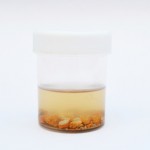

 High uric acid levels – known as hyperuricemia – increase the risk of gout, kidney disease, and early death. Uric acid is the product of the breakdown of purines. Purines are found in many of the foods we consume daily like red meat and even alcohol. When purines are broken down and turned into uric acid, they travel through the bloodstream into the kidneys where they are expelled through urination. When there is an excess amount of uric acid that remains in the body, it can build up in other parts of the body – most commonly around the joints of the big toe, where gout can be found.
High uric acid levels – known as hyperuricemia – increase the risk of gout, kidney disease, and early death. Uric acid is the product of the breakdown of purines. Purines are found in many of the foods we consume daily like red meat and even alcohol. When purines are broken down and turned into uric acid, they travel through the bloodstream into the kidneys where they are expelled through urination. When there is an excess amount of uric acid that remains in the body, it can build up in other parts of the body – most commonly around the joints of the big toe, where gout can be found.
An excess of uric acid is due to two factors: 1) your body produces an excess amount on its own through the digestive process, or 2) your kidneys are unable to filter uric acid out of the body. Both scenarios lead to hyperuricemia.
Because we ingest foods that contain purines, our bodies will contain uric acid. As long as we are able to get rid of the uric acid we remain healthy. Before you start reducing your uric acid you must first understand what constitutes normal levels. In males, uric acid levels should range between 2.5 to 8 mg/dL and in women, it’s 1.9 to 7.5 mg/dL.
Children, on the other hand, should keep a range between three and four mg/dL. The levels will increase with the start of puberty for males, but for females, the levels will remain relatively low until menopause.
Other factors that determine uric acid levels are height, blood pressure, body weight, kidney function, and alcohol intake.
As mentioned, uric acid levels can be determined by how purines are broken down during digestion and the kidneys’ ability to filter it out. But there are other causes for high uric acid levels, including:
 Taking diuretics
Taking diureticsHigh uric acid levels can affect the body in many ways, including increasing the risk of gout, kidney disease and even contribute to early death.
 First and foremost, high uric acid levels are commonly associated with the arthritic condition known as gout. Consuming a diet rich in purine foods can increase uric acid levels, which can ultimately lead to gout.
First and foremost, high uric acid levels are commonly associated with the arthritic condition known as gout. Consuming a diet rich in purine foods can increase uric acid levels, which can ultimately lead to gout.
Gout is a form of arthritis, which can cause severe pain and swelling commonly around the big toe. As uric acid forms around the joint in the big toe it can cause redness, warmth and, of course, pain.
One study followed 47,150 men without gout for 12 years. The men were given questionnaires to find out if they fit the criteria for gout. Every four years diet was assessed with a food-frequency questionnaire.
By the end of the study 730 men developed gout and the highest risk factors were the consumption of meat and seafood. Those who consumed dairy had the lowest risk.
 Aside from causing joint pain, excessive amounts of uric acid can contribute to kidney stones. Kidney stones are described as being one of the most painful experiences a person can encounter – some even report it’s more painful than childbirth! Although often kidney stones can be passed or removed, in some cases they can damage the kidneys by causing an obstruction, which prevents the kidneys from filtering out waste, or by scarring the kidneys due to the stones rough edges. Both scenarios can contribute to chronic kidney disease or, even worse, kidney failure.
Aside from causing joint pain, excessive amounts of uric acid can contribute to kidney stones. Kidney stones are described as being one of the most painful experiences a person can encounter – some even report it’s more painful than childbirth! Although often kidney stones can be passed or removed, in some cases they can damage the kidneys by causing an obstruction, which prevents the kidneys from filtering out waste, or by scarring the kidneys due to the stones rough edges. Both scenarios can contribute to chronic kidney disease or, even worse, kidney failure.
If the kidneys have endured damaged or kidney function has been reduced for three months or longer, chronic kidney disease can be caused. In cases of kidney failure, dialysis may be required, which can cause further complications or even death.
One study found that high uric acid levels were associated with all-cause and cardiovascular mortality in seniors. During the study, researchers from Taiwan found that men with high uric acid levels were more common than women. These high levels also increased the risk of cardiovascular mortality and was independent of other cardiovascular risk factors, including hypertension, diabetes, high cholesterol and glomerular filtration rate levels.
The authors wrote, “Further studies are warranted to investigate the prognostic implications and potential utility in the monitoring of therapy.”
The below list outlines daily foods in our diet grouped by their risk of increasing gout and gout attacks.
 Green vegetables
Green vegetables Organ meats, liver, kidney, sweetbread and brains
Organ meats, liver, kidney, sweetbread and brainsHere is what you need to incorporate into your diet to help reduce uric acid levels and prevent conditions like gout and kidney disease.
 Apple cider vinegar
Apple cider vinegar
Copyright © www.orthopaedics.win Bone Health All Rights Reserved